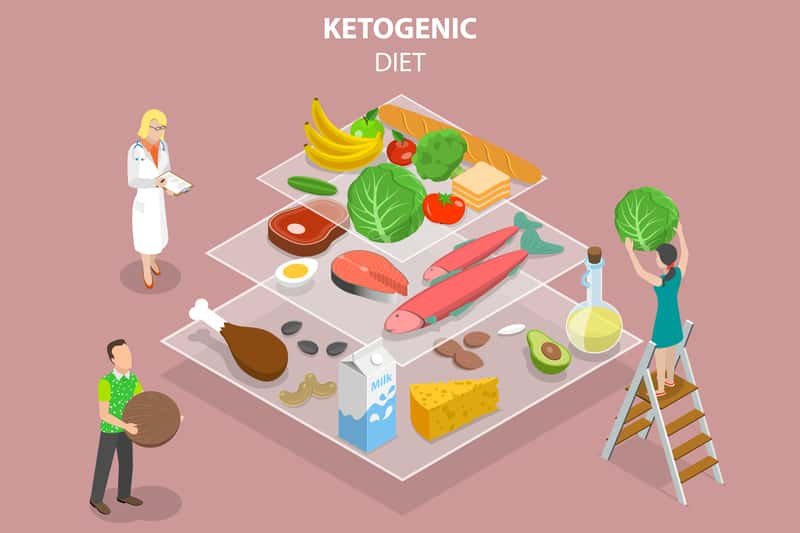In This Article
Introduction
The keto diet has seen a surge in popularity lately, largely because it effectively aids in weight loss. Yet, this low-carb, high-fat diet offers more than just a way to drop pounds. Embracing a keto lifestyle can bring a variety of advantages for your overall health and well-being. Here are seven unexpected ways that the keto diet can enhance your health beyond simply losing weight.
1. Enhanced Mental Clarity and Focus
Ketosis is a metabolic state that happens when the body switches from using glucose as its main energy source to using ketones, which are made from breaking down fats. This transition can significantly affect how our brains function.
Understanding Ketosis and Its Impact on Brain Function
When the body enters ketosis, it generates ketones that act as an alternative fuel source for the brain. Unlike glucose, ketones provide a steadier and more efficient energy supply, resulting in fewer energy spikes and dips. The brain is quite sensitive to blood sugar changes, and when glucose levels fall, cognitive abilities can suffer. However, during ketosis, the brain receives a consistent flow of energy, which can enhance mental clarity.
Cognitive Performance Benefits
- Improved Focus: Many people notice better concentration and focus while in ketosis. This is likely because the steady energy supply from ketones minimizes the chances of brain fog and distractions.
- Greater Mental Sharpness: Ketones have neuroprotective properties, supporting brain health and lowering the risk of neurodegenerative issues. Individuals may experience sharper cognitive abilities and faster processing speeds.
- Better Memory: Some research indicates that ketosis can boost memory retention and recall, which can be especially advantageous for students or professionals engaged in tasks requiring sharp mental focus.
- Less Anxiety and Mood Fluctuations: Regular blood sugar swings can lead to mood swings and increased anxiety levels. Ketosis helps stabilize energy levels, contributing to a more even mood and reduced anxiety.
2. Enhanced Energy Levels
One of the unexpected advantages of the Keto diet is its potential to boost energy levels, particularly through a process known as fat adaptation. When individuals follow a Keto diet, their bodies enter a state of ketosis, where they switch from using carbohydrates as their main source of fuel to relying on fats instead. This transition allows the body to access a more abundant energy supply—its fat stores—leading to improved endurance over time.
How Fat Adaptation Increases Endurance
Fat adaptation is the body’s capability to burn fat for energy efficiently. When carbohydrate intake is significantly reduced, the body begins to adapt by increasing the production of enzymes that facilitate fat oxidation. This adaptation not only improves the body’s ability to utilize fat as a fuel source but also helps maintain steady energy levels throughout the day. Many athletes have reported enhanced stamina and extended performance during endurance activities after becoming fat-adapted. This is because fat provides a more stable energy source compared to carbohydrates, which can lead to energy spikes followed by crashes.
Comparison with Carbohydrate Reliance
In contrast to a fat-adapted state, relying on carbohydrates for energy can cause rapid fluctuations in blood sugar levels. This results in quick bursts of energy that are often followed by crashes, leaving individuals feeling fatigued and in need of frequent refueling during extended physical activities. The Keto diet addresses this issue by stabilizing blood sugar levels and offering a consistent energy source. Consequently, those adhering to the Keto diet typically find they can perform better in endurance sports or long-duration activities without the constant need for carbohydrate intake.
In summary, the Keto diet promotes fat adaptation, which not only aids in weight loss but also significantly enhances overall energy levels and endurance. This makes it a powerful strategy for improving health and performance beyond just losing weight.
3. Better Blood Sugar Control
One of the standout benefits of the ketogenic (keto) diet is its ability to help with blood sugar control, which is important for overall health. The keto diet, with its focus on high fats, moderate proteins, and very low carbohydrates, empowers you to take control of your body’s energy source. This shift in diet puts the body into a state called ketosis, where it starts burning fat for energy instead of carbohydrates, giving you a new level of control over your blood sugar levels.
Impact on Insulin Sensitivity
By cutting down on carbs, your body needs less insulin to keep your blood sugar levels in check. Insulin sensitivity is how well your body responds to insulin, which is key for regulating blood sugar. When insulin sensitivity improves, the body uses insulin more effectively, leading to lower blood sugar levels after meals and a decreased risk of insulin resistance over time. This is especially helpful for people with prediabetes or type 2 diabetes, as it can help keep blood sugar levels stable.
Potential Benefits for Diabetics
For those with diabetes, the keto diet offers a ray of hope. Cutting back on carbs often means fewer blood sugar spikes and drops, resulting in steadier energy levels throughout the day and fewer cravings for sugary snacks. Some research also suggests that the keto diet can lower HbA1c levels, which is a long-term indicator of blood sugar control, showing that the body is managing glucose better. This potential for improved blood sugar control, coupled with the weight loss that comes with the keto diet, can lead to a brighter future for those managing diabetes.
It’s important to remember that while the keto diet can offer significant benefits for those with diabetes, it’s crucial to consult your healthcare provider before making major dietary changes. This ensures that your treatment plan stays on track and that you’re making the best choices for your health and well-being.
In short, better blood sugar control is a significant and somewhat unexpected benefit of the keto diet that goes beyond just losing weight, making it an appealing choice for thoseseeking to enhance their overall health and effectively manage conditions such as diabetes.
4. Greater Feeling of Fullness and Less Hunger
The ketogenic (keto) diet is well-known for its weight loss benefits. Still, it also excels at increasing feelings of fullness and decreasing hunger, which makes it easier for people to stick to their dietary goals. A big part of this effect comes from incorporating healthy fats into the diet.
The Importance of Healthy Fats in Controlling Appetite
One of the defining features of the keto diet is the high consumption of healthy fats, which are essential for regulating appetite. Unlike carbohydrates, fats take longer to digest, resulting in a more gradual release of energy and helping to keep blood sugar levels stable. This slower digestion process fosters a sense of fullness and reduces the chance of experiencing sudden hunger pangs.
In addition, fats trigger the release of specific hormones, like cholecystokinin (CCK) and peptide YY, which communicate with the brain to indicate that the body is satisfied and doesn’t require more food. This hormonal response is critical for controlling appetite and can lead to a significant reduction in calorie intake throughout the day.
The Impact on Cravings
With reduced hunger and increased fullness, many people find they have fewer cravings for snacks and unhealthy foods while following a keto diet. The combination of healthy fats and moderate protein intake helps maintain energy levels and stabilizes mood, further lowering the urge to indulge in sugary or high-carb foods.
Additionally, as the body becomes more adept at using fat as fuel—a state referred to as ketosis—the need for frequent meals decreases. This transition not only supports weight loss but also promotes better overall health, including enhanced mental clarity and less irritability tied to hunger.
In summary, the keto diet’s capacity to enhance feelings of fullness and reduce hunger through the inclusion of healthy fats can lead to fewer cravings. This not only assists with weight management but also improves overall well-being, positioning the keto diet as an effective strategy for those seeking to enhance their health beyond merely losing weight.
5. Support for Heart Health
The ketogenic (keto) diet, which emphasizes high fats and low carbohydrates, offers several health benefits, particularly for heart health. Here’s a closer look at how the keto diet can influence heart health:
Impact of the Keto Diet on Cholesterol Levels
One of the key benefits of the keto diet is its impact on cholesterol levels. While traditional advice often recommends cutting back on fats to lower cholesterol, research shows that the keto diet can actually improve lipid profiles for many people.
- Increase in HDL Cholesterol: The keto diet is known to elevate high-density lipoprotein (HDL) cholesterol, commonly referred to as “good” cholesterol. Higher HDL levels can reduce the risk of heart disease by helping to transport cholesterol away from the arteries and back to the liver for processing.
- Decrease in Triglycerides: People on a keto diet generally see significant drops in triglyceride levels. High triglycerides are a risk factor for heart disease, so lowering them can enhance heart health.
- Impact on LDL Cholesterol: The effect of the keto diet on low-density lipoprotein (LDL) cholesterol, often labeled as “bad” cholesterol, can vary from person to person. While some may see an increase in LDL cholesterol, it’s crucial to understand the type of LDL. The keto diet tends to shift LDL particles from small, dense forms (which are more harmful) to larger, less harmful ones. This change can help reduce the risks typically associated with elevated LDL levels.
Potential Reduction in Heart Disease Risk Factors
The keto diet may also play a role in lowering the risk of developing heart disease through various mechanisms:
- Weight Management: The keto diet is known to be effective for weight loss, and maintaining a healthy weight is vital for heart health. Extra weight can heighten the risk of hypertension, high cholesterol, and type 2 diabetes, all of which are significant factors for heart disease.
- Improved Blood Sugar Control: The diet’s low carbohydrate content can lead to steadier blood sugar levels and better insulin sensitivity. Good blood sugar control is essential for preventing type 2 diabetes, a major risk factor for cardiovascular disease.
- Anti-Inflammatory Effects: Some research indicates that the keto diet may possess anti-inflammatory properties. Chronic inflammation is associated with various heart diseases, and reducing inflammation can lead to improved heart health outcomes.
In summary, while the keto diet can support heart health in multiple ways, individuals must consult healthcare professionals before making any major dietary changes, especially those with existing heart conditions or other health issues.
6. Anti-Inflammatory Benefits
Ketosis is a metabolic state that occurs when you drastically cut down on carbohydrates and increase your fat intake. This process has been associated with several anti-inflammatory benefits. When the body enters ketosis, it shifts to burning fat for energy, producing compounds called ketones that are known to have anti-inflammatory effects.
Connection between Ketosis and Inflammation
Research indicates that following a ketogenic diet may help lower inflammation in the body. While inflammation is a natural reaction to injury or infection, chronic inflammation can lead to various health problems, such as autoimmune diseases, heart disease, and neurodegenerative disorders. By changing the body’s main energy source from glucose to ketones, the production of inflammatory markers might decrease, which can result in overall reduced inflammation.
Examples of Conditions That May Improve
- Arthritis: Some studies suggest that people with arthritis may find relief from joint pain and stiffness when they adopt a ketogenic diet, likely due to the reduction in inflammation.
- Diabetes: Ketosis has the potential to enhance insulin sensitivity and stabilize blood sugar levels, which can help manage inflammation linked to type 2 diabetes.
- Neurological Disorders: Conditions like epilepsy and Alzheimer’s disease may benefit from the anti-inflammatory properties of ketosis. Ketogenic diets have been used as a treatment for epilepsy and are currently being studied for their potential protective effects against neurodegeneration in Alzheimer’s.
- Metabolic Syndrome: This term describes a group of conditions, including obesity and high blood pressure, often associated with chronic inflammation. Adopting a ketogenic lifestyle may help tackle these issues and lead to a decrease in inflammatory markers.
Integrating a ketogenic diet into your routine may provide notable anti-inflammatory benefits, potentially improving various health issues linked to chronic inflammation. However, it’s crucial to consult with a healthcare professional before making significant changes to your diet, especially for individuals with existing health concerns.
7. Potential Cancer Therapy Aid
Recent studies are showing that a ketogenic diet, which is high in fats and low in carbohydrates, could play a helpful role in cancer treatment. This diet shifts the body’s metabolism away from glucose, which many cancer cells rely on, towards ketones. This change may impact cancer cell growth.
Overview of Emerging Research on Keto and Cancer
Researchers have been looking into how a ketogenic diet interacts with cancer therapies. It turns out that many cancer cells primarily use glucose for their energy needs. By cutting down on carbohydrate intake, the ketogenic diet can lower blood sugar levels, which in turn reduces the amount of glucose available to these cells. This adjustment in diet may create conditions that are less favorable for tumor growth, potentially slowing its development and improving the effectiveness of standard treatments like chemotherapy and radiation.
Mechanisms by Which Ketosis May Inhibit Tumor Growth
- Energy Source Alteration: Cancer cells often demonstrate the Warburg effect, where they mainly use glucose for energy, even when oxygen is present. Inducing ketosis enables the body to produce ketones, which serve as an alternative energy source that may not fuel some tumors as effectively.
- Reducing Insulin Levels: A ketogenic diet tends to lower insulin levels, which can reduce the signals that encourage cancer cell growth. Insulin not only helps manage blood sugar but also promotes cell growth and division, potentially accelerating cancer development.
- Increased Oxidative Stress: Ketone bodies can create a more oxidative environment, which might increase stress on cancer cells and make them more vulnerable to apoptosis or programmed cell death.
- Modulation of Inflammation: There’s a link between ketosis and reduced inflammation, which plays a role in the onset and progression of various cancers. By lowering inflammatory markers, a ketogenic diet could enhance overall health and possibly slow tumor growth.
- Enhanced Efficacy of Conventional Treatments: Some studies suggest that a ketogenic diet might boost the effects of chemotherapy and radiation by making cancer cells more sensitive to these treatments while helping to protect normal cells from damage.
In summary, although larger clinical trials are necessary to fully grasp the effects of the ketogenic diet on cancer therapy, the initial findings are promising. They underscore the potential of dietary changes as a complementary strategy in cancer treatment plans.
Conclusion
In summary, the ketogenic diet offers an interesting way to improve health, with various benefits like reducing inflammation and possibly helping with cancer treatment. By changing the body’s energy source from carbs to fats, ketosis can help with weight management and may also boost the effectiveness of traditional medical treatments. While studies are ongoing, it’s clear that what we eat plays a crucial role in our health. However, people need to talk to healthcare professionals before making major changes to their diet, especially if they have existing health issues, to ensure it’s safe and effective.
FAQs
What is a ketogenic diet?
A ketogenic diet often referred to simply as “keto,” is a way of eating that is high in fats and low in carbohydrates. The primary goal of this diet is to shift your body’s metabolism from relying on glucose, which comes from carbs to using ketones, which are produced from fat. This shift can lead to various health benefits and changes in energy levels.
How does a ketogenic diet affect inflammation?
Research indicates that adopting a ketogenic diet may aid in reducing inflammation in the body. By switching to ketones for energy, the production of inflammatory markers can decrease, potentially leading to a reduction in chronic inflammation and its associated health issues.
Can the ketogenic diet aid in weight loss?
Absolutely! One of the appealing aspects of a ketogenic diet is that it can promote weight loss. When your body starts burning fats for fuel instead of carbs, many people find their hunger and appetite decrease. This can make it easier to maintain a calorie deficit without feeling deprived.
Is it safe to follow a ketogenic diet long-term?
While many individuals can follow a ketogenic diet for an extended period, it’s important to approach it thoughtfully. Consulting with a healthcare professional is crucial to ensure that this lifestyle aligns with your personal health needs and goals, especially if you have existing health conditions.
How does the ketogenic diet impact diabetes? ,
The ketogenic diet may offer benefits for those managing diabetes. Improving insulin sensitivity and helping stabilize blood sugar levels could be an effective strategy for some individuals, particularly in managing type 2 diabetes and the inflammation commonly associated with it.
Can children follow a ketogenic diet?
Some ketogenic diets have been used successfully to treat childhood epilepsy, demonstrating its potential therapeutic benefits. However, any dietary changes for children must be done under strict medical supervision to ensure safety and effectiveness.
What are ketones, and how are they produced?
Ketones are fascinating molecules produced by the liver from fatty acids when carbohydrate intake is low. They serve as an alternative energy source for the body, especially during periods of fasting or when following a ketogenic diet, allowing you to keep your energy levels up even in the absence of carbs.
Are there any side effects of starting a ketogenic diet?
Yes, some people may experience side effects when starting a ketogenic diet, commonly referred to as the “keto flu.” This can include symptoms like headaches, fatigue, and nausea, particularly during the first few days as the body adapts to this new way of fueling itself.
Can a ketogenic diet interact with cancer treatments?
Interesting research has emerged suggesting that a ketogenic diet might enhance the effectiveness of certain cancer treatments. By potentially making cancer cells more vulnerable to therapy and lowering insulin levels, it could be a valuable adjunct in a comprehensive treatment approach. However, any dietary changes should always be discussed with a healthcare provider.
What types of foods are included in a ketogenic diet?
A ketogenic diet typically includes a variety of delicious foods! You’ll find healthy fats like avocados and oils, along with nuts, seeds, and low-carb vegetables. Protein is consumed in moderate amounts, while carbohydrates are significantly limited. This allows for a satisfying and nutritionally balanced approach to eating.
Is it necessary to track macronutrients on a ketogenic diet?
While tracking macronutrients can be a helpful tool for reaching and maintaining ketosis, it’s only sometimes necessary for everyone. Your individual preferences, lifestyle, and personal goals will ultimately dictate whether you need to keep a close eye on your macros or if you prefer a more intuitive approach to eating.

Clara
Dr. Clara is a dedicated physician and fitness expert specializing in preventative medicine and lifestyle management. With a medical degree from University of California San Francisco and certifications in personal training and nutrition, she provides holistic, personalized care. Dr. Clara is passionate about empowering individuals to achieve their health and fitness goals through balanced, sustainable practices.







